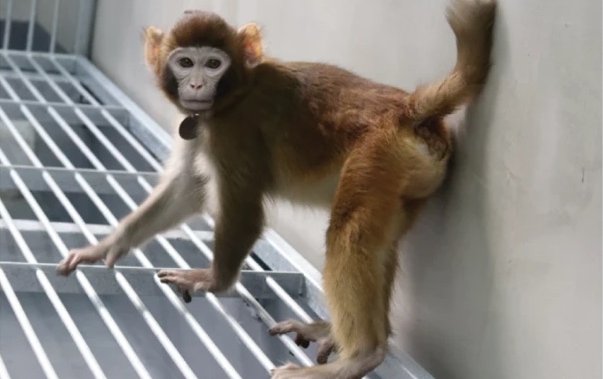For the very first time, a successfully cloned rhesus monkey has survived to adulthood, according to a study published Tuesday in Nature Communications. The primate’s name is Retro and he is already over two years old.
Retro may be the first of his species to be cloned by scientists, but he’s not the first monkey. Some of the same researchers from the Chinese Academy of Sciences that brought Retro into the world are also responsible for the first ever cloning of monkeys, back in 2018, when two cloned macaques were born.
At the time, one of the authors of the macaque study told the Associated Press that the successful monkey clones showed that the cloning of humans was theoretically possible — though he added that the team had no intention of doing so; mainstream scientists oppose cloning humans on ethical grounds.

As for why scientists chose to clone rhesus monkeys, the paper states that these primates are often used in medical and clinical research because of their genetic similarity to humans.
Get the latest National news.
Sent to your email, every day.
“We could produce a large number of genetically uniform monkeys that can be used for drug-efficacy tests,” says Mu-ming Poo, director of the Institute of Neuroscience in the Chinese Academy of Sciences in Shanghai. But the researchers admit that there is still a long way to go to make cloning efficient for use in a biomedical setting.
In their experiment, the scientists created 113 cloned embryos, implanted 11 of them into seven surrogates, and only achieved two pregnancies. Retro was the only monkey that was born.
Retro was cloned similarly to Dolly the sheep, back in 1996, a technique called somatic cell nuclear transfer (SCNT). The process involves inserting the nucleus of a somatic (body) cell into an egg cell that has had its own nucleus removed. The cloned cells are then implanted in a surrogate mother.
The Chinese scientists attempted this process with rhesus monkeys but ran into roadblocks trying to get the cloned cells to survive in utero. A new technique was developed that involves transplanting the cells into a non-cloned embryo that was produced via in vitro fertilization. “We think that there might be additional … abnormalities to be fixed. Strategies to further enhance the success rate of SCNT in primates remains … our main focus in the future,” Falong Lu, an author of the study, told CNN.
Not all scientists are convinced cloned monkeys will have useful applications in medical research.
Robin Lovell-Badge, of the Francis Crick institute in London, told the BBC that having “animals of the same genetic make-up will reduce a source of variation in experiments.”
He also questioned if cloning monkeys “is really worth it.”
“The number of attempts they had is enormous. They have had to use many embryos and implant them into many surrogate mothers to get one live born animal,” Lovell-Badge said. “You cannot make any conclusions about the success rate of this technique when you have one birth. It’s nonsense to ever propose you can. You need at least two, but preferably more.”
Miguel Esteban, a principal investigator with the Guangzhou Institute of Biomedicine and Health, who wasn’t involved in the cloning study, sees merits to the research.
“This research is proof of principle that cloning can be done in different non-human primate species and opens the door to new ways of enhancing the efficiency. Cloned monkeys can be genetically engineered in complex ways that wild-type monkeys cannot; this has many implications for disease modelling. There is also a species conservation perspective,” he added.
© 2024 Global News, a division of Corus Entertainment Inc.





